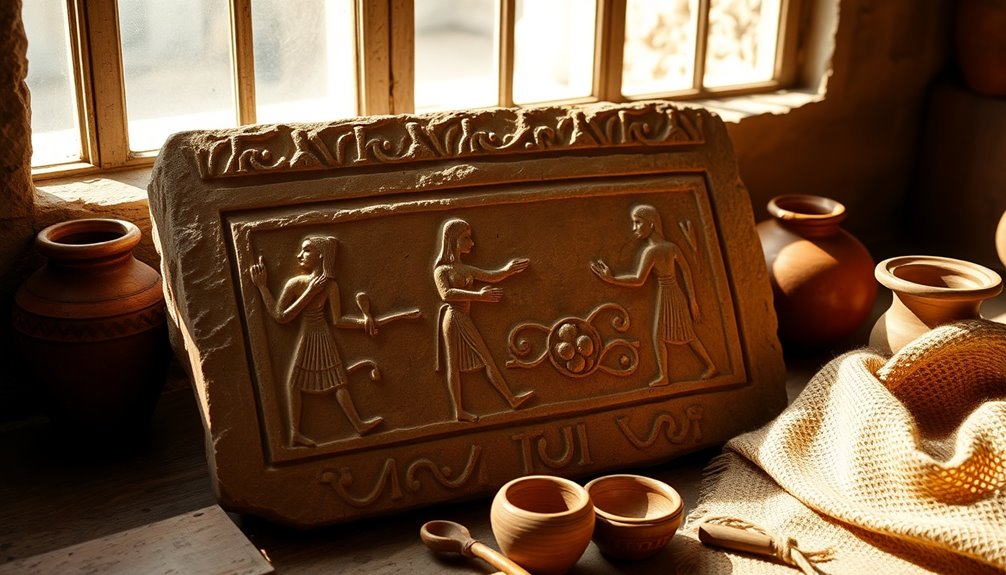Soul ties aren't explicitly mentioned in the Bible, but you can find their essence in deep emotional bonds, like that of David and Jonathan in 1 Samuel 18:1. The Scriptures emphasize the importance of guarding your heart, as seen in Proverbs 4:23, which encourages healthy relationships. There's acknowledgment of both uplifting and harmful connections, stressing personal responsibility in your choices. Misunderstandings around soul ties can lead to unhealthy attachments, distracting from a genuine relationship with Jesus. As you explore further, you'll uncover practical steps to evaluate and cultivate your own relationships in a way that honors biblical principles.
Key Takeaways
- The term "soul ties" is not explicitly found in the Bible, but deep relationships are illustrated, like David and Jonathan's bond.
- 1 Corinthians 6:16 warns against sexual immorality, emphasizing the implications of intimate relationships without implying spiritual dependencies.
- Proverbs 4:23 encourages guarding one's heart and evaluating relationships to prevent unhealthy attachments.
- Healing from unhealthy connections is supported through community prayer and accountability, as highlighted in Matthew 18:20.
- Prioritizing a relationship with Jesus is essential for spiritual growth and understanding the nature of relationships.
Introduction

When exploring the concept of soul ties in the Bible, you might be surprised to find that the term itself isn't explicitly mentioned. However, the idea is woven throughout scripture, especially in the context of relationships outside of marriage. For instance, the deep bond between David and Jonathan illustrates a profound connection, but it's essential to recognize how such ties can also lead to unhealthy attachments.
The Bible warns against ungodly soul ties and urges you to guard your heart, as Proverbs 4:23 reminds us. Toxic relationships can lead to emotional and spiritual harm, creating what feels like breaking soul ties that bind you to negative influences.
Misinterpretations of these scriptures may leave you feeling like a victim of your circumstances rather than empowering you to make responsible choices regarding your relationships.
Understanding the implications of soul ties encourages discernment and the establishment of healthy boundaries. Recognizing the potential for both positive and negative connections helps you navigate your relationships wisely.
Ultimately, the Bible emphasizes the importance of spiritual well-being, guiding you to foster connections that uplift rather than bind you.
Biblical Insights on Soul Ties

When you explore the concept of soul ties in the Bible, you'll find key references that shape your understanding.
Primary texts like 1 Samuel 18:1 illustrate deep emotional bonds, while 1 Corinthians 6:16 highlights the implications of physical unions.
You'll also want to consider Proverbs warnings about unhealthy relationships and the importance of guarding your heart.
Primary Bible References
Understanding soul ties in the context of the Bible involves exploring various relationships that illustrate deep emotional and spiritual connections. One prominent example is the bond between David and Jonathan in 1 Samuel 18:1, which reflects a profound friendship. Although the term "soul ties" isn't explicitly mentioned, the concept resonates throughout Scripture.
1 Corinthians 6:16 highlights the impact of sexual intimacy, indicating that such relationships create a one-flesh union. This underscores the importance of being cautious about connections formed through sexual immorality, as they can lead to unhealthy soul ties.
Proverbs 1:10 warns against ungodly relationships, urging you to be discerning in your friendships to prevent harmful influences. The Bible encourages you to guard your hearts (Proverbs 4:23), emphasizing your responsibility to maintain healthy connections.
Toxic relationships can lead to emotional and spiritual harm, making it essential to evaluate who you allow into your life. Lastly, 1 John 1:9 reminds you of the necessity to confess our sins, offering a pathway to spiritual healing and restoration from unhealthy attachments.
Secondary Bible References
Exploring secondary Bible references offers deeper insights into the nature of soul ties and their implications. While the term "soul ties" isn't explicitly found in scripture, the concept is illustrated through various relationships. For instance, David and Jonathan shared a profound bond (1 Samuel 18:1), highlighting deep emotional connections that can arise between individuals.
In 1 Corinthians 6:16, Paul warns that sexual intimacy creates a "one flesh" union, underscoring the physical and spiritual implications of such relationships. This suggests that soul ties may form through significant emotional and sexual interactions, necessitating caution.
Proverbs 1:10, 15 encourages discernment in friendships, reminding you to be wary of influences that might lead you astray.
Moreover, guarding your heart (Proverbs 4:23) is crucial to avoid toxic relationships that can cause emotional and spiritual harm. Establishing healthy boundaries is essential in maintaining your well-being and ensuring that your connections with others are beneficial rather than detrimental.
Recognizing these biblical insights can help you navigate relationships with wisdom and intention, fostering connections that uplift rather than bind.
Ancient Near Eastern Relationships

In the context of the Ancient Near East, relationships were built on deep emotional and spiritual connections that shaped every aspect of life. Marriages were viewed as sacred unions, with the concept of becoming "one flesh" highlighting the belief that physical intimacy created profound ties between individuals.
These bonds weren't merely physical; they intertwined the souls of partners, establishing a commitment that went beyond the surface.
Rituals and ceremonies, like the exchange of vows, played a crucial role in reinforcing these relationships. Such acts were binding commitments, creating connections that resonate with modern interpretations of soul ties.
Friendships also held significant importance, as seen in the bond between David and Jonathan. Their relationship exemplified strong emotional ties characterized by mutual loyalty and sacrificial love, showcasing the value placed on deep connections.
Social structures in the Ancient Near East emphasized family and community ties. Your relationships influenced not only your personal identity but also your social status and the collective well-being of the community.
In this context, every connection formed had far-reaching implications, illustrating the depth and significance of relationships in that era.
Cultural Context of Soul Ties

While many people today view soul ties through the lens of emotional and physical connections, it's essential to recognize how these perspectives can diverge from biblical teachings.
Modern culture often promotes the idea that emotional attachments and sexual freedom are inherently positive, but this conflicts with biblical warnings against ungodly connections.
Cultural influences encourage you to prioritize personal experiences, which can overshadow the scriptural emphasis on holiness and commitment. Relationships are often framed through a lens of personal rights, neglecting the biblical call to guard your heart.
In contemporary discussions, soul ties may reflect spiritual dependencies formed in various relationships, including friendships and romantic involvements. However, this interpretation can lead to misconceptions about spiritual bondage and the importance of discerning godly from ungodly ties.
To navigate your relationships wisely, it's crucial to align your understanding of soul ties with biblical principles.
Recognize that not all emotional connections are healthy or beneficial. Instead, focus on fostering relationships that honor God and promote spiritual growth, keeping the biblical warnings in mind as you build your connections.
Misunderstanding Soul Tie Definitions

When it comes to soul ties, many misconceptions can cloud your understanding.
You might find that certain scripture passages are misinterpreted, leading to beliefs about mystical connections that the Bible doesn't actually support.
Let's clarify these misunderstandings and explore what the scriptures truly say about relationships and emotional bonds.
Debunk Common Misconceptions
Misconceptions about soul ties often stem from a lack of clarity regarding their definitions and biblical context. The term "soul ties" isn't found in the Bible, which suggests that the concept relies heavily on human interpretation rather than scriptural foundation.
For instance, while 1 Samuel 18:1 highlights deep friendships, it doesn't imply any spiritual bindings or mystical connections between souls.
Additionally, 1 Corinthians 6:16 warns against sexual immorality by emphasizing the physical aspect of becoming "one flesh," without implying a spiritual union of souls. This misunderstanding can lead you to feel bound or fragmented, promoting unhealthy attachments and a reliance on rituals instead of recognizing your personal accountability for choices.
Believing in soul ties may distract you from the biblical principle of guarding your heart and making wise relational choices, as noted in Proverbs 4:23.
Instead of focusing on mystical connections, it's more beneficial to evaluate your relationships critically and avoid toxic influences. By doing so, you'll foster healthier connections based on mutual respect and spiritual growth, free from the misconceptions surrounding soul ties.
Misinterpretation of Scripture Context
Understanding the concept of soul ties requires a careful examination of how scripture is interpreted. The term "soul ties" isn't explicitly mentioned in the Bible, leading to misinterpretation and confusion about its meaning.
For instance, 1 Samuel 18:1 highlights the deep friendship between David and Jonathan, but it doesn't suggest a mystical bond as modern interpretations often claim. Similarly, 1 Corinthians 6:16 warns against sexual immorality by emphasizing physical unity—"one flesh"—instead of implying that sexual acts create spiritual connections.
This misinterpretation can lead to the false belief that sexual intimacy produces cosmic bonds, diverting attention from personal responsibility and the choices you make. When teachings on soul ties promote a victim mentality, they may encourage reliance on rituals for healing rather than fostering a genuine relationship with Jesus, which is essential for true spiritual growth.
Healing Through Prayer Groups

Healing through prayer groups offers you a unique opportunity to connect with others who understand the struggles of unhealthy soul ties.
In this supportive environment, you can engage in group prayer that invites God's healing power into your life.
Together, you'll participate in meaningful activities that promote accountability and foster spiritual growth.
Group Prayer for Healing
When you participate in group prayer for healing, you open yourself to a powerful collective experience that can help break ungodly soul ties. In this supportive environment, you and others seek God's intervention together, praying for restoration and spiritual freedom.
Sharing your struggles in a group fosters accountability and mutual encouragement, essential elements in your healing journey.
Scriptural references, like Matthew 18:20, remind you that God is present when two or three gather in His name, amplifying the spiritual power of your prayers. As you engage in group prayer, you often incorporate confession, repentance, and forgiveness, vital steps in breaking those soul ties and reclaiming your spiritual health.
Through this shared experience, you may also find opportunities for deliverance ministry, leading to transformative encounters with God.
These moments not only enhance your healing but also provide a deeper sense of wholeness and freedom. Embracing this group dynamic allows you to experience the profound impact of prayer, enabling you to release past burdens and move toward a more fulfilling spiritual life.
Supportive Fellowship Activities
As you engage in supportive fellowship activities like prayer groups, you'll find a nurturing space where you can share your experiences with soul ties and seek collective healing. These groups provide an environment where you can openly discuss unhealthy emotional attachments while drawing strength from others who understand your journey.
In prayer groups, scriptural teachings and testimonies foster a sense of community, accountability, and encouragement. You'll learn practical steps for breaking soul ties, such as confession and renunciation of past commitments, which are essential for your spiritual growth. Regular participation enhances your emotional well-being and empowers you to establish healthy boundaries.
As you connect with others in these prayer groups, you'll discover the importance of seeking forgiveness and pursuing godly relationships that align with biblical principles. This supportive fellowship can be a vital tool in overcoming spiritual challenges tied to ungodly soul ties.
Engaging in these activities not only helps you heal but also strengthens your relationship with God and others. Embrace the power of collective prayer, and watch as your journey toward healing unfolds.
Final Thoughts on Soul Ties

While the concept of soul ties isn't directly addressed in the Bible, it prompts important reflections on our relationships and spiritual connections. You might find that deep relationships, like that of David and Jonathan, illustrate the profound bonds we can form.
However, it's vital to recognize the potential for unhealthy relationships that can lead to emotional harm. Proverbs 4:23 reminds us to guard our hearts, emphasizing the importance of maintaining boundaries.
In 1 Corinthians 6:16, the focus shifts to personal responsibility, highlighting how physical unity, particularly through sexual immorality, can complicate our spiritual health. Misinterpretations of soul ties can promote a victimhood mentality, diverting attention from the necessity of accountability and repentance.
Instead of relying on rituals for healing, you're encouraged to take charge of your spiritual journey.
To foster spiritual growth, prioritize your relationship with Jesus and seek His guidance in overcoming unhealthy attachments. By doing so, you'll cultivate a deeper understanding of yourself and your connections with others.
Ultimately, reflecting on these relationships can lead to healthier dynamics and a more fulfilling spiritual life.
Additional Resources

Many people seek additional resources to deepen their understanding of soul ties and their implications on relationships. While the term "soul ties" isn't explicitly mentioned in the Bible, various scripture passages highlight emotional connections that can influence our lives.
You might find it helpful to study key biblical examples, like the friendship between David and Jonathan, to grasp the nature of deep bonds without falling into unhealthy interpretations.
Consider joining community support groups or engaging in scriptural study materials that focus on biblical teachings about relationships. These resources can help you navigate the complexities of emotional connections while emphasizing personal responsibility.
For instance, 1 Corinthians 6:16 warns against sexual immorality, reminding you to guard your heart, as mentioned in Proverbs 4:23.
Counseling that incorporates biblical principles can also provide valuable insights into managing relationships and understanding the importance of your choices.
Frequently Asked Questions
Which Bible Verse Talks About Soul Ties?
You won't find a specific Bible verse that directly mentions "soul ties."
However, consider 1 Corinthians 6:16, which highlights the profound connection formed through sexual intimacy, stating, "the two will become one flesh." This verse illustrates how relationships can create deep bonds.
Additionally, Proverbs 4:23 encourages you to guard your heart, reminding you to be mindful of the emotional and spiritual attachments you form with others.
What Does "Soul Tie" Mean in the Bible?
When you hear the term "soul tie," it typically refers to a deep emotional or spiritual bond formed between individuals, often through intimate relationships.
It suggests a connection that can impact your thoughts, feelings, and behaviors. While some believe these ties can be mystical or permanent, it's crucial to recognize the importance of maintaining healthy boundaries.
You should focus on personal accountability in your relationships, guarding your heart against influences that may lead to spiritual harm.
How to Break a Soul Tie According to the Bible?
To break a soul tie, you need to start by acknowledging the unhealthy connection.
Confess your sins and repent, committing to change your behavior.
Renounce the tie verbally, perhaps through prayer, to reclaim your spiritual space.
It's crucial to forgive both yourself and others involved, as holding onto bitterness can keep you bound.
Finally, engage in prayer and seek God's guidance for emotional healing and divine support throughout this process.
How Do You Know if You Have Soul Ties to Someone?
You know you have soul ties to someone if you find yourself constantly thinking about them, struggling to move on from past relationships, or feeling emotional distress when the connection feels threatened.
If you experience obsessive thoughts or dreams about them, it might indicate an unhealthy attachment.
Additionally, feelings of dependency or anxiety tied to this person can signal that your emotional bond may be stronger than it should be.










